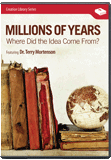They Can’t Allow “It”!
Those Christians who believe in evolution and/or millions of years destroy the fundamental nature of the Bible.
Those Christians who believe in evolution and/or millions of years just cannot allow "it." To do so would destroy the fundamental nature of what they believe.
- To allow "it" would mean that their belief in the supposed millions of years in the fossil record never existed-this "it" would eliminate millions of years of supposed history.
- The "it" would show that God does not break His promises.
The "it" refers to the global Flood of Noah's day. Let me explain.
I find it fascinating that Dr. Hugh Ross from Reasons to Believe (a Christian organization that promotes the idea that God created over millions of years) recognizes that he can't believe in a global Flood and millions of years at the same time. He has accepted the millions-of-years timeframe of the secular world.
If you accept a real global Flood, then you destroy (rightly) evolution's millions of years of history.
It is obvious that if there was a global Flood, this catastrophic event would have eroded billions of tons of sediments . . . and then would have deposited them all over the world. (As a comparison, just look at what happened with the small, local catastrophe of the 1980 eruption of Mount St. Helens and the almost immediate formation of massive sedimentary deposits.)
Think about it: if you accept a real global Flood, then you destroy (rightly) evolution's millions of years of history, as supposedly recorded in the fossils found in the layers of rock. You see, the eroding of these layers by the Flood-and then the "re-depositing" of the sediments and the destroying of many of the fossils-would eliminate much of this "evidence" of these alleged millions of years. It's an important point.
In his book, The Genesis Question, Ross states:
Most skeptics (and even non-skeptics) assume that a Flood of such immense proportions would leave behind substantial evidence, a deposit that geologists should be able to find.
Well, let me put it another way: if there really was a global Flood, you would expect to find billions of dead things buried in rock layers laid down by water all over the earth . . . which is exactly what you do find!
Now, recognizing there are massive sedimentary layers laid down by water all over the earth and full of dead things, Ross continues by stating:
The assumption that clear evidence "should" remain must be challenged. The Flood, though massive, lasted but one year and ten days. A flood of such brief duration typically does not leave a deposit substantial enough to be positively identified thousands of years later.
Of course, how could that be "typical" when he has never experienced such a flood of that duration? So, what do you do when the evidence is obviously there? You just wave it away with a "magic wand" by saying there is no way an event we've never witnessed could do that (even though we've seen many local catastrophes cause massive erosion and deposition)?
"I set My bow in the cloud, and it shall be for a sign of a covenant between Me and the earth. It shall come about, when I bring a cloud over the earth, that the bow will be seen in the cloud, and I will remember My covenant, which is between Me and you and every living creature of all flesh; and never again shall the water become a flood to destroy all flesh.
"When the bow is in the cloud, then I will look upon it, to remember the everlasting covenant between God and every living creature of all flesh that is on the earth"
(Genesis 9:13-16, NASB).
Besides, in Genesis 9, God promised that He would never again send a flood to destroy all flesh and cover the earth-the rainbow being the sign of that promise. There have been lots of floods since Noah's day, but never a global one. To believe in a local flood, then, is to say that God broke His promise.
The Flood was a major event in earth's history. Those who believe in millions of years ardently reject that this global event ever occurred. By doing so, they (whether Christian or non-Christian) are proclaiming that the words of Genesis 6-9 cannot be taken as written. If that's so, should anyone believe the rest of Genesis (or the rest of the Bible for that matter) as written?
AiG has produced another one of its witnessing booklets entitled Was there really a Noah's Ark and Flood? to teach the truth concerning the global Flood of Noah's day. At the same time, it teaches the lesson symbolized by the Ark, which God told Noah to build to save the land-animal "kinds" (and his family) from the destroying effects of the Flood.
Just as Noah and his family had to go through a doorway into the Ark to be saved, so each of us needs to go through a doorway to be saved: Jesus Christ, the Son of God, is our Ark of salvation.
Recommended Resources

Answers in Genesis is an apologetics ministry, dedicated to helping Christians defend their faith and proclaim the good news of Jesus Christ.
- Customer Service 800.778.3390
- Available Monday–Friday | 9 AM–5 PM ET
- © 2025 Answers in Genesis






